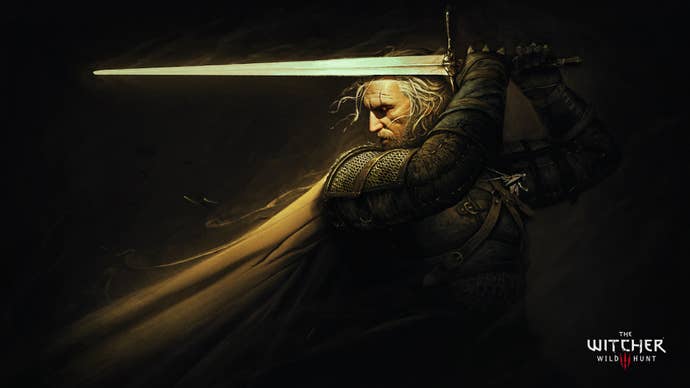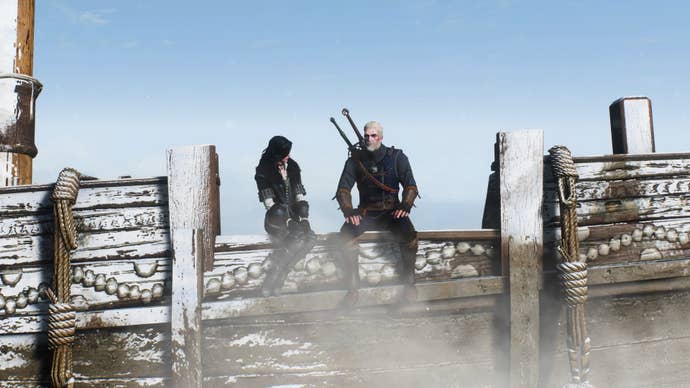They say the nicest things.
“Sod off, you misborn clod,” a guard will tell me.
Or if I’m really lucky, “Go fuck your mums tits!”

What a world to live in.
The thing is, I love this about the game.
Even now, it manages to make me laugh.

I can’t help it.
Maybe it’s all of it.
Whatever it is, it makes the world of The Witcher 3 stand out to me.

It makes it special.
I cannot think of another game that does it in the same way.
All of which makes me wonder.

There must be a concerted effort behind it.
So who’s responsible for it?
And how on earth did they come up with so much filth?

This, then, is my mission to try and find out.
First stop, CD Projekt Red.
Apparently he even had to write a few drunks and children to pass a pre-work exam.

There was, then, a lot of empty space to fill.
That was the sole purpose of the department.
The way the team did this was by creating a range of what Sawicki calls inputs.

“So when you walk into someone, this is a bump input,” he explains.
And when you walk close to someone, that’s a greeting input.
That’s a lot of greetings.
You’ll be blasted by a cacophony of noise (and usually, abuse).
The associated historical time-period of each game played a role, too.
“Back then we assume, ‘Fuck it, that’s how the world worked.
It simply fits that period of time.”
In Cyberpunk 2077, you’re no one special.
It’s no longer in Cyberpunk because it wouldn’t make sense."
This is someone that doesn’t fit in the universe," he says.
“You look at him and you know, ‘Okay, he’s not from here.’
So we expect that the world is going to be reacting to Geralt in a certain way.
“And that was the beauty for me,” he adds.
But how do you come up with the words?
But Sawicki wrote hundreds, possibly even more.
So where did he fill his font of filthy inspiration from?
Well, it’s quite simple really: he turned to real-life.
He was particularly fond of good old Polish family gatherings for finding new material, he tells me.
Really, you might take a lot from overhearing their conversations.”
(I wonder which family gatherings they came from.)
He thinks about other lines in terms of the characters they belonged to.
“My brother gave me a sword!”
she’ll tell you if you meet her.
“I named it Needle!”
Sawicki wasn’t sure anyone would even notice it.
Sawicki had cleared some things up for me, then.
But I still hadn’t answered all of my questions.
And for that I need the person Sawicki worked for in the Living World team: Bartosz Ochman.
And apparently the kind of lines I’m interested in already existed back then.
And I was testing these kinds of elements during my testing routines.
And I was like, ‘Guys, is this a question?
Like, of course!
I’m dreaming about that.’
So that was the start of my journey."
And that was Ochman to begin with, and then Ochman and Sawicki.
“But I’m not a hundred percent sure.”
“And I was like, hmm, that’s interesting…” Ochman says.
And the more he thought about it, the more he liked it.
But he wanted to push the idea further.
“So I just created this list of gossips made with question and answers.”
It works like this.
Ochman also created a variety of ways people would then react to what they’d heard.
“So somebody was surprised, someone was disgusted,” and so on.
“And you felt that every time that this discussion is different,” he says.
“It was like, ‘Whoa!’
If he was hungry, he’d make a guard talk about how hungry they were in the game.
He thinks he wrote something like 7000 lines of dialogue all in all.
It was like pure madness,” he says.
He still catches himself listening into other people’s conversations now, apparently.
‘I’m missing something,’ he’ll think.
And of course what he’s missing is the noise he used to seek out.
“Funny thing,” he reflects.
“This was the funniest one,” he says.
He is proud of making up the Nilfgaardian language, too.
And when he heard the voice actors eventually perform it, “It was like, ‘Whoa!’
That sounds really cool and believable.”
The effect of all of this work on the game is something Sawicki talked a bit about too.
Because what’s not immediately obvious is that for a long time, the game has no noise.
It feels great.'"
Most people say that, anyway.
Everyone is cursing at me."
To which Ochman duly replied, “Man, you’re the Witcher!
Everyone hates you!”
Ochman had taken me back further in time, closer to where the story of these incidental dialogues begins.
But I still hadn’t quite reached the beginning.
I’ve met him before -I remember talking to him about The Witcher 3 when it was released.
“That’s where it all started,” Blacha tells me.
“It began with the BioWare games,” he goes on.
He means the originalBaldur’s Gategames and, particularly,Neverwinter Nights.
The Witcher 1, remember, was built on the Neverwinter Nights engine.
So it was something CD Projekt Red wanted to do to make its game as interactive as possible.
They couldn’t do as much as they wanted to do.
A dwarven character walks past Geralt and loudly exclaims, “Shit in my boots!”
It feels eerie because of how far CD Projekt Red has come since then.
So I wonder what are the governing rules of noise and silence in the games.
“When you create those communities in the game, it’s always about statistics,” Blacha says.
And that’s the way it was designed to have these peaks of something happening."
“I can’t remember exactly but it was measured,” he says.
“And we didn’t have an algorithm to do it.
We were trying and we were tweaking, and it was like rinse and repeat.
But yes, there are metrics.
I think even those parameters [every 10 seconds] are somewhere in the game.
I don’t remember exactly where but they are.”
“So it’s you!”
“It was inspired by Nightmare on Elm Street,” Blacha says.
And it’s still something he believes the studio can push even more on.
“I mean, yes, it obviously can be perfected,” he says.
“It’s because of the budget - you cannot record too many lines.
So in every aspect, it will be a game changer.”
But what if in doing it this way, something is lost?
To me, there’s something in the humanity of the dialogues I am drawn to.
They feel real as a result.
And now that I know some were pulled from real-life, it makes me appreciate them all the more.
They’re actual cuttings from life.
But that’s a future problem.
Today I’m off for a walk in Novigrad, to soak up a bit of local culture.
“Little prick.”